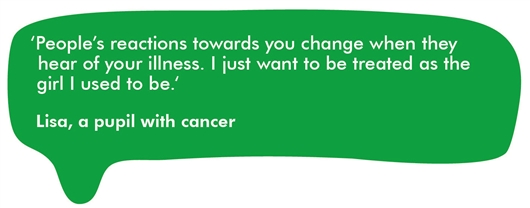Today is World Teachers’ Day! With the new school year fully in swing, our Editor Lauren highlights the invaluable information and support we provide to teachers and schools to support young people affected by cancer.
We understand that cancer is a big subject and can be difficult to talk about, especially with children. But we want to make sure cancer isn’t the elephant in the (class)room. We have information, advice and resources depending on the situation.
Tips for teachers
If a pupil at your school has cancer, you might want to think about the following:

If a pupil has a relative with cancer, you should think about the following:
We have information and advice about talking to children when an adult has cancer. This covers questions children might ask and their possible reactions. Our free booklet Preparing a child for loss may also have some useful advice at this time. We also have information for young carers of people with cancer, which your pupil might find useful.
If a pupil or member of staff dies, here are some ways you can support children through the grieving process:
Teaching toolkit
Our free Talking about cancer toolkit aims to encourage young people to talk about cancer and inspire them to make healthy choices for their future. The toolkit can help you when teaching children about this. It’s aimed at children aged 9 to 16 years old as part of their lessons in citizenship, science or PSHE.
The toolkit includes:
You can order a toolkit for free here. To ask about the availability of these materials in Welsh, please contact schools@macmillan.org.uk
To see what else Macmillan's cancer information team has been blogging about, please visit our blog home page! You can subscribe to receive our blogs by email or RSS too.
We're with you every step of the way
The Macmillan team is here to help. Our cancer support specialists can answer your questions, offer support, or simply listen if you need a chat. Call us free on 0808 808 00 00.
Comments? Feel free to add them below (you need to be logged in).
Keep in touch Follow Macmillan’s cancer information team on Twitter @mac_cancerinfo
Whatever cancer throws your way, we’re right there with you.
We’re here to provide physical, financial and emotional support.
© Macmillan Cancer Support 2026 © Macmillan Cancer Support, registered charity in England and Wales (261017), Scotland (SC039907) and the Isle of Man (604). Also operating in Northern Ireland. A company limited by guarantee, registered in England and Wales company number 2400969. Isle of Man company number 4694F. Registered office: 3rd Floor, Bronze Building, The Forge, 105 Sumner Street, London, SE1 9HZ. VAT no: 668265007